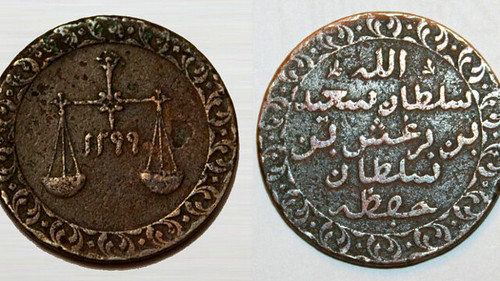
PREV ARTICLE
NEXT ARTICLE
FULL ISSUE
PREV FULL ISSUE
ANCIENT COIN COULD REWRITE AUSTRALIAN HISTORY
Dick Hanscom forwarded this Daily Mail article about a coin find that raises questions about the earliest discoverers of Australia. We first discussed this story in March 2013.
-Editor
Written history of Australia only dates back to 1606, when Dutch explorers landed in the region, and researchers from Indiana University want to find out how the thousand-year-old copper coins ended up on the other side of the Indian Ocean six centuries earlier. Lead researcher, Australian scientist Ian McIntosh said the coins were first discovered by soldier Maurie Isenberg in 1944. Isenberg was stationed on the Wessel Islands - an uninhabited group of islands of the north coast of Australia - during World War II and he found the coins buried beneath the sand. In 1979, Isenberg sent the coins to an Australian museum and now McIntosh wants to investigate how they arrived on the island.
I’ll be curious to learn the outcome of his expedition.
Mind you, after earlier articles about very old coin finds it was noted that these could well have found their way mixed in ballast of ships from a much later time.
-Editor
To read the complete article, see: The discovery that could rewrite Australian history: Ancient copper coins suggest the country was found SIX CENTURIES before Captain Cook arrived (www.dailymail.co.uk/sciencetech/article-2327362/Coins-suggest-Australia-discovered-SIX-CENTURIES-Captain-Cook-arrived-island.html)
Bill Rosenblum forwarded this story from The Age. Thanks.
-Editor
To read the complete article, see: Ancient discovery set to rewrite Australian history (www.theage.com.au/national/ancient-discovery-set-to-rewrite-australian-history-20130519-2juck.html)
Chris Fuccione forwarded this story, which includes a curious coin image. Thanks!
-Editor

Historians credit James Cook with discovering Australia back in 1770. But a long ignored discovery of five African copper coins in its Northern Territory, along with a map with an "X" on it, suggests somebody beat him to it — and by a long shot. If validated, the coins could mean seafarers from distant lands reached Australia much earlier than previous thought.
Umm, how does that coin date to the 900s to 1300s? I read the Arabic date as 1299, but that equates to 1881 AD. I checked with some experts to confirm my suspicion.
-Editor
Princeton numismatic curator Alan Stahl writes: It's a copper Pysa of Sultan Bargash Ibn Sa'id of Tanzania, AH 1299, equal as you say to CE 1881-82. Good catch. George Cuhaj of Krause Publications adds: Obviously someone thinks it is an AD date written in Arabic, rather than an AH date which needs the addition of the years. Steve Album or Joe Lang at Steve's company should be able to figure this out. Chris Fuccione contacted Ian McIntosh, the main researcher from Indiana University. Apparently the illustration used in this article is NOT one of the coins in the hoard after all. McIntosh writes: The coins from Australia are held in the Powerhouse Museum in Sydney and are not on public display.
Thanks, everyone! Glad to clear that up. We'll be curious to learn the outcome of the expedition.
-Editor
To read the complete article, see: These 1,000-year-old coins could rewrite Australia's history (http://io9.com/these-1-000-year-old-coins-could-rewrite-australias-hi-509355104)
To read earlier E-Sylum articles, see:
ANTHROPOLOGIST SEEKS ORIGIN OF REMOTE AUSTRALIAN COIN HOARD
(www.coinbooks.org/esylum_v16n10a30.html)
The Numismatic Bibliomania Society is a non-profit organization promoting numismatic literature. See our web site at coinbooks.org. To submit items for publication in The E-Sylum, write to the Editor at this address: whomren@gmail.com To subscribe go to: https://my.binhost.com/lists/listinfo/esylum All Rights Reserved. NBS Home Page Contact the NBS webmaster 
|
